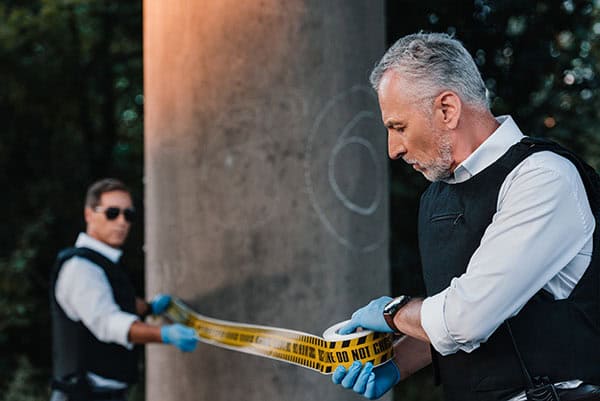1. Investigation: this is where it all starts. The police will look into people to gather evidence of an alleged crime.
2. Charge: if the investigation pans out, the person will be charged and will start appearing in court.
3. Trial: once charged, the person has a right to a trial. At trial, the prosecutors have to prove your guilt beyond a reasonable doubt.
4. Sentencing: instead of a trial, a person can plead guilty and proceed to sentencing. Also, if you lose trial, you will have to proceed to sentencing.
5. Appeal: if you are unhappy with the result, you can ask a higher court to reverse it.
Some files will have fewer phases. For example, if you plead guilty, your file may have only three phase. We can help you with any phase of the file.
During the investigation, the police are gathering evidence to decide whether to charge you. We can advise you on what to do and expect during this time. We suggest that you retain us right away upon learning that you are under investigation. The decisions you make here affect the rest of the file. Unfortunately, we see too many clients making bad decisions during investigation that deeply hurt them later.

In the initial charge stage, you will have been charged and required to attend court. Our key services include:
Trial will take place if you plead not guilty. At trial, the prosecutors will bring their witnesses to tell the judge what happened. We question the witnesses to bring out aspects helpful to our defence. You have the right, but not the obligation, to tell the judge your side. This is a very big decision that we will help you make. If you speak in court, the prosecutor will question you to strengthen their case and damage ours. At the end, the lawyers make arguments to the judge on what the judge should do. The judge will then give a decision of guilty or not guilty.

Conducting a good trial requires careful preparation and good tactical decision-making. It often takes many hours of preparation to properly question a witness for half an hour or make an hour of arguments to the judge. Our services for trial include:
If you win at trial, the charges are dismissed and you are free. If you lose, we proceed to sentencing.
Sentencing takes place if you plead guilty or lose trial. This is when you will receive your punishment. A very wide range of sentences are available under the Criminal Code. The options range from receiving no criminal record and getting a sentence that you won’t even notice to very difficult conditions that will fundamentally change your life to spending 2 years on almost 24-hour lockdown at home to long prison sentences.
The sentence imposed depends on the “circumstances of the offence and offender.” That’s why they say that “sentencing is an individualized process.” Just as important as the deed done is who did it. For example, a person with severe mental health difficulties will be treated more leniently than a wise and conniving planner.
Our services for sentencing include:
Appeals happen when you are unhappy with the result at trial or sentencing. Both conviction after trial and the sentence imposed can be appealed, or just one. Appeals involve looking at the recordings (transcripts) of what happened at trial and/or sentencing, and the reasoning of the judge, and assessing whether any legal errors were made.
Our appeal services include:
Appeals are complicated and very time-consuming. They are academic insofar as they involve a lot of reading, writing, and research. It is a niche practice area since most lawyers do not do appeals.
As you can tell from the above general summary, there are a lot of moving parts in a criminal case. Each phase builds on the last and requires its own legal, practical, and tactical skillset. We are highly experienced with all phases of a criminal case.
To learn more about what we can do about your specific case and how it’s looking and why, call us at 250-713-8821 or use this contact form.
355 Burrard St Suite 1000, Vancouver, BC V6C 2G8
© 2024 Zargarian Litigation. All Rights Reserved. Web Design By Front Page SEO & Website Design